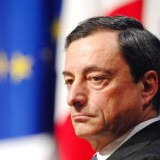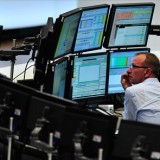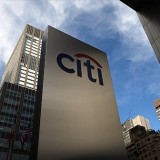Posted on 23 July 2014. Tags: Europe
The European markets corporate debt are “duped” by the monetary incentives of the central banks and the volume of aggressive transactions is dangerously close to excessive levels reached before the financial crisis, warns in a report credit rating agency Standard & Poor’s (S&P).
The artificial downed interest rates not only promote inefficient allocation of capital, but also encourage excessive speculation in financial markets that could ultimately cause more harm than good when the boom is turned into a collapse, commented the analysts from S&P.
The agency concerns revolve around whether the companies capitalize on the issue of whether cheap debt and use it in the most effective manner. S&P believes that business confidence in Europe remains low, causing companies to issue more debt at record low interest rates than funds invested in capital investment. Because firms choose to borrow rather than invest, the central bank can not produce self-sustaining recovery in the region. Instead, as Europe and USA show upward trends in the volume of mergers and acquisitions, increased debt issuance and growth buyouts financed by credit. This indicates a decline of market discipline that increasingly rely on financial engineering to generate returns instead of economic growth.
The outlook for European markets is still very dark and much worse than the one in USA. The warnings from S&P does not prevent it from issuing more elevated scores than decreased in the corporate sector. In June, the agency warned that corporate debt in the Asia-Pacific region will exceed the total of such North America and Europe by 2016.
Posted in Comments, Finance
Posted on 22 July 2014.
In weeks when the prices junk bonds decrease, some investors continue to be concerned. This is a signal that a record search of the risk class of corporate debt may finish. For years, the bond investors pour money into high-yield bonds, looking for high returns in an environment of low interest rates. But yields have fallen to such an extent that even the US Federal Reserve (Fed) has expressed concerns.
In the week ended July 16th, mutual funds and exchange-traded funds that invest in high-yield bonds reported withdrawals totaling 1.69 billion USD. This is the largest outflow of August 2013. However, the auctions did not spread to other parts of the bond markets. While the investors withdraw their junk bonds investments they increase the exposure to the corporate debt with investment grade.
The withdrawal of the low quality part of the market come amid a fall in prices and the corresponding increase in profitability that seen last month. According climate index Barclays High Yield Bond the yield increased from a record low 4.83% recorded on June 20th. This is a historically low level, but is a sign that the assessments have decreased.
One of the risks for investors, invest in junk bonds is that these securities have lower liquidity compared to highly evaluated corporate bonds. If investors try to exit at the same time, price movements can be extremely sharp and harsh, warn traders. The credit assessment of the issuers remains satisfactory especially since the beginning of economic recovery. This is the reason why the rates of default risk remained low. Moreover, the Fed said it would keep interest rates near zero. This further encourages investors seeking income.
Posted in Comments, Finance
Posted on 22 July 2014.
In 2014, the hedge fund managers may not achieve the profits that have rewarded investors last year. This can happen because of the backdrop of record high valuation of shares, growing concerns about a correction in the stock market. Almost half of the 150 hedge fund managers expect to achieve a return of 5% or less in 2014. Last year, the hedge funds realized an average return of 11%, while in 2012 the profits were 10%.
The stocks reported solid first half. The indices hit record after record almost every day. The YTD S&P 500 and Nasdaq have increased its value by 7% and 6%. Japan is the only developed market, which fell behind in the first six months. For this period, the leading Nikkei 225 index lost 6% of its value.
Moreover, last week the chairman of the US Federal Reserve Janet Yellen and her colleagues warned of “significant high marks” in some sectors. Overall Yellen sought to calm fears that there is a bubble of the US markets after the current record of the Dow Jones Industrial Average and S&P 500.
“Although the prices of real estate, stocks and corporate bonds rose significantly increased their scores, they remain in line with historical levels”, she said.
In July reallocated to shares means they were the second highest peak in 13 years. About 61% of investors overestimate now shares says the latest report of the Bank of America Merrill Lynch. According to the Bank reallocated to share resources fund managers seem “overpriced”, so in the fall may follow correction, since the shares are now more expensive in May 2000.
Posted in Comments, Finance
Posted on 22 July 2014. Tags: European Union
Eurozone needs QE, according to the experts from ECB and IMF. IMF recently addressed the issue in a report, which notes that the economic recovery in the Eurozone remains “weak and uneven”. The Passivity is dangerous for the European economy. This stability in the financial markets can easily be fleeting, given the dangerous combination of high debt, low growth and low inflation. Even without the volatility in the markets where current policies vulnerable countries are doomed to unnecessarily high unemployment for many, many years.
ECB is not responsible for structural reforms, nor alone can eliminate excessive debt. However, she is responsible for ensuring its own inflation targets. Unfortunately inflation (including core) oscillates around 1%, which is well below the bank level to 2%. Moreover, as the IMF notes, still well below the potential growth in the euro area continues to pull down inflation.
In its annual report, the Bank for International Settlements (BIS) pointed out that the ECB should ignore its inflation target. Deflation as it is not of great importance. This statement ignores the risks of increasing real debt, lower consumption, weakening economies and even more excessive debt. It also ignores obstacles to competitive adaptability in ultra low inflation, let alone deflation. In a nutshell BIS suffers from shocking complacency.
Fortunately, the ECB did not accept this defeatist advice. It cut rates, even had a negative rate on bank deposits to her. Bank credit facilities introduced through targeted long-term financial operations. ECB terminate the sterilization of its purchases of securities. The central bank expanded eligible collateral in credit schemes. In addition, the Bank is working on the possibility of buying securities backed by mortgages. Supply of such assets, however, is too weak to allow significant purchases.
Alternatives are large purchases of government securities. According to the European leaders IMF programs, however, such purchases are appropriate and feasible.
Quantitative easing (QE), in which central banks infuse liquidity through the purchase of securities have become a standard tool of monetary policy in economies trapped in low inflation. QE may increase confidence in the inflation target of the ECB to raise asset prices reduce real interest rates and strengthen the balance sheets of households, firms and banks. They can also decrease the Euro. Thus QE may increase the supply and demand for loans.
Policy often requires a choice between unpleasant alternatives. The choice is between the ECB to address the immediate threat - low demand and very low inflation and concerns about remote danger - renewal of the credit boom and bubble in asset prices. The objectives of the ECB and its common sense oblige the bank to tackle the first risk. It should begin purchases of government bonds - the arguments are convincing.
Posted in Comments, Finance
Posted on 21 July 2014.
Developing countries took record amounts of capital markets in the first half of the year even after warnings of central bankers that “the euphoria of the debt markets” can cause big problems in the future. In the first half of the volume sold in developing countries government bonds reached 69.47 billion USD. This is an increase of fully 54% over the same period last year. This increase becomes 2014 record emissions government debt made by emerging economies. The figures do not include emissions of Chinese government debt, as it is not available on international markets.
The total volume of debt issues in developing countries remains small compared with that of developed economies, which have been placed 157.6 billion USD in the first six months of 2014.
Years of ultra-low interest rates and unconventional monetary policy measures in the world after years of financial crisis pushed down bond yields globally. This fact has prompted investors to seek riskier assets in the bond market. The accommodative monetary policy provide sufficient incentives for countries to raise cash.
In April, Greece emitted debt for 20 billion EUR to the first issuance after the period in which the indebted country sparked the debt crisis threatening the stability of the Eurozone. Cyprus is back on the international market only a year after the banking collapse, left to fill the financial gap of 10 billion USD. In mid-June Kenya set a record for the highest debut in the international bond markets on the African side. Kenya placed bonds worth 2 billion USD, and the issue was oversubscribed four times. Ecuador lost access to international capital markets after failing to make payment on its debt in 2008, successfully selling new debt to 2 billion USD.
Some analysts fear that if interest rates in the developed world begin to rise, will repeat last year’s situation in which only calls for the withdrawal of unconventional monetary measures by the Fed triggered outflows from developing countries.
Last month, the Bank for International Settlements warned about the dangers of rising debt levels in the world. For some countries, the room for maneuver is narrowing in the presence of low interest rates, experts found the financial institution.
Posted in Comments, Finance
Posted on 19 July 2014. Tags: Japan
The weaker JPY and fails to encourage the necessary growth of the Japanese economy on exports and to contribute to increasing inflation needed to revive the third largest economy in the world. More than 18 months ago, the Prime Minister Shinzo Abe of the country began its “Abenomika” depreciating JPY by nearly 30% by large monetary stimulus from the Bank of Japan. However, this did not lead to a boom in exports of power as hoped.
The annual Japanese exports fell for the first time in 15 months in May, but more worrying is that the weaker JPY failed to help boost its economists. According to the experts the Japanese exports will expand when the companies decide that they want to take a large share of exports and start taking advantage of the weaker JPY, which increase their capacity to expand production and then you will see the effect. According to the analysts the real boom will likely occur in 2015/16.
The economists point to several reasons why the engine of Japanese economic growth - namely exports failed to achieve tangible growth despite the big drop in the yen against other major currencies. The first is that Japanese companies do not take the opportunity to seize market share abroad by aggressively lower prices, as has happened in previous periods when the yen was weak. In the past, 20% decline in the yen could lead to 17% lower prices, but this time it was only 6%, a study of Japanese business magazine Nikkei. In short, Japan is trying to increase their profits, they do not reduce prices, analysts say.
On the other hand, Japanese exporters would suffer from difficulties even in the weakness of the JPY as global demand is weak. Now we see the worst years of the world trade since 2011, so it is unrealistic to expect Japanese exports to perform well. The Japanese exports to its biggest trading partner - the United States declined by 2.8% yoy in May, which was the first decline in 17 months. Moreover, the JPY, whose rate against the USD is about 101 JPY, will face difficulties in its further depreciation.
Other analysts note that the policy of weakening the JPY is aimed not so much at boosting exports as to lift the price of imports to Japan out of deflation spiral.
Finally, the main arguments, analysts, is that a weaker JPY will be an adjunct, rather than cause a boom in exports.
Posted in Comments
Posted on 18 July 2014. Tags: Japan
The Aggressive Japanese foreign policy against China and South Korea could seriously harms local business. The government of the Prime Minister Shinzo Abe has repeatedly provoked their neighbors with aggressive foreign policy and liberal attitude towards the military, when territorial disputes sparked violent anti-Japanese protests in China. If the relationship with the first and third largest trading partners of Japan, however, get worse, it would hamper an already fragile economic recovery, in which Abe lead the country.
The manufacturers of steel and non-ferrous metals, electronics and high-tech equipment are the most affected, with about half of them have some problems. The most frequent complaint of companies are weaker sales, with some mention of difficulties in the supply of materials or goods. Other companies say they face obstacles in the implementation of their projects as their future or former partners refuse to negotiate, and this is particularly true for state-controlled companies.
Concerns for the safety of employees abroad and suspected goods are slow at customs are also among those inconveniences of companies. Since taking office in December 2012, the Government of Abe ended decades of cuts in military spending, enliven the defense industry and the government to lift the ban does not help friendly countries subject to military aggression. In response, Beijing and Seoul are the biggest victims of Japanese aggression during World War II, Abe accused of trying to recover militarism. The Japanese territorial disputes with both sides to small islands also exacerbated the dialogue between them, as diplomatic tensions spilled over on investment.
The investment of the Japanese companies in China fell by 30% in 2013, while those in South Korea tumbled by 18%, according to the Japan External Trade Organization. On the other side stands a growth of 21% of investments in Asia and 70% jump in the Philippines. The trend of China continued in 2014, in the first quarter Japanese investment in Celestial Empire tumbled more than doubled to 1.3 billion USD, but South Korea was marked up 43% to 1.1 billion USD.
Shinzo Abe met with leaders of all Southeast Asian countries, but not with the presidents of China and South Korea. This week, Abe said he wants to meet with Chinese President at the meeting of the Asia-Pacific in Beijing in November to improve relations between the two countries.
Posted in Comments, Economy
Posted on 08 July 2014.
The permanent imbalance on the market, in which only 20% of the economy units - listed on stock exchanges companies and banks receive 100% of the available funds and political capital, stifles the other 80%. That was stated in the last survey expectations for the third quarter of the Danish financial institution Saxo Bank. Assessment was presented by Chief Economist of the company company - Steen Jakobsen. In his presentation of the stock market remains “reasonable”, but only because of the faith of the market in the QE and the widespread preference for investing in stocks.
“Without transfer of the funds from those 20% back to the other 80%, we will face a decade of Japonization. A correction of this imbalance is essential to restarting the world economy. Consensus that growth is small enough, it is alarming, and ignores the larger issues”, signed Jakobsen.
Saxo Bank predicted relatively positive third quarter of 2014, as the institution remains optimistic that the growth in USA will return after an unexpectedly strong decline of 2.9% in January-March. The experts say volatility should recover from record lows after the third round of quantitative easing of the US Federal Reserve.
In January, International Monetary Fund (IMF), World Bank, European Central Bank (ECB), Fed and most economists bank competed to declare 2014 as the year of recovery. Entering the second half, Europe appears vulnerable, budget deficits are rising and political backroom deals purchased during the parties. USA must achieve an annual growth of 2.9% in the second quarter to reflect zero growth for the first half of 2014. Asia continue to believe that it can implement a soft landing, something being equivalent to attempting to run a super tanker in a river.
According to Saxo Bank there is a significant spike in oil prices due to the destabilization of Iraq. However, this jump in percentage terms is still relatively small. Most negatively affected currencies in case of further increases in oil prices will be those countries that rely heavily on energy imports. Listed among developing countries fall Turkey, Poland and Hungary, which are highly dependent on external energy sources.
Posted in Business, Comments, Finance
Posted on 08 July 2014. Tags: Gazprom, Rosneft, Russia
Russia expects to receive approximately 18 billion USD less in the form of dividends in 2016, after the state companies, among which energy giants Gazprom and Rosneft, reduced the amount of dividends. After the statement of the Russian Ministry of Finance on the New York Stock Exchange the shares of the largest natural gas producer in the world Gazprom fell sharply. Yesterday the price of the American depositary receipts of the company fell with 1.2% to 8.82 USD.
Moscow expects to receive 152.1 billion rubles (4.4 billion USD) in the form of dividends in 2016. The amount is 80% smaller than the original 761 billion rubles. However, the forecast for 2015 was revised upwards - 28.7 billion rubles to 229 billion rubles. The estimates for 2017 show revenues of 167.3 billion rubles.
The decision relates to a possible delay in the implementation of the government’s plan to increase the payout ratio of dividends of the state-owned companies to 35% of the net profit in 2016 because of international accounting standards. The estimates were lowered because the ministry has decided to calculate only a portion of the dividends under the International Financial Reporting Standards (IFRS) and the rest - in Russian rules with a lower payout ratio.
The lower forecast comes after the signals from a number of state companies for decrease in the dividend expectations. For example, Gazprom will pay 84.4 billion rubles (2.5 billion USD) in the form of dividends in 2016, which is about 32% less than expected. This can affect also the big investment plans of the company. In the next 10 years, Gazprom plans to spend 55 billion USD to build a gas pipeline to China and the development of deposits in East Siberia. Furthermore, the energy giant will have to finance the 22 billion USD pipeline “South Stream”.
Transneft might pay dividends of 3.6 billion rubles, which is nearly 93% less. The second largest bank in Russia VTB will give 15 billion rubles, which is 42% less. The other energy giant Rosneft will pay 95% less dividends or a value of 27.2 billion rubles.
Furthermore, according to the document of the Ministry of Finance, there is a risk the budget not to receive the expected 423.5 billion rubles planned for this year’s sale of 19.5% of the its share in Rosneft. These news comes at very hard year for the Russian economy pressed by the EU and USA with economy sanctions. Russian gross domestic product contracted by 0.3% in the first quarter compared with the final 2013 addition, the central bank expects anemic growth of 0.4% this year, which is the weakest growth since 2009.
In the first hours of trading on the stock exchange in Moscow today Gazprom shares rose with 1.69% to 152.85 rubles, those of Rosneft rose with 0.85% to 251.10 rubles and the shares of VTB grew with 0.91% to a value of 0,043 rubles. Currently the leading MICEX index increased by 1.02% in value to 1,529.11 points.
Posted in Business, Comments
Posted on 24 June 2014. Tags: BNP Paribas, France
France seeks support from its European partners to try to limit the fine to BNP Paribas for violating US sanctions against Iran and other countries. The French Government punishment for the bank was disproportionate to the probability financial institution to cause systemic risk to the sector. The President of France Francois Hollande had discussed the issue with German Chancellor Angela Merkel. The French ministers met with representatives of other governments, including the UK, speaking on condition of anonymity.
The diplomatic maneuvering occurred against a backdrop of the envisaged agreement between BNP Paribas and the US government. Banks are expected to pay a fine in the amount of 8-9 billion USD, and agreed to be divided by number of employees. Some of them alone has already left the bank.
Washington insists, moreover, be temporarily “frozen” the French bank transactions in USD. The negotiations between the two parties on exactly how can this happen without affecting the vast trading network of the bank in the United States. One of the reasons that the U.S. Prosecutor calls for more severe measures against BNP compared to fines for other banks (eg HSBC), is the large amount of transactions carried out by BNP, which violate the sanctions imposed by Washington. According to the US authorities, the French bank was founded regional banks in Africa and the Middle East to cover such transactions. The Bank currently denies these accusations.
Paris warned recently that the case of BNP Paribas could harm negotiations between USA and the European Union (EU) on the transatlantic trade agreement. According to the source of the issue of the fine French bank is widely discussed by European regulators and central banks. Some financial institutions are concerned that the ECB may reflect a possible risk of such sanctions and the results of these stress tests.
Posted in Comments, Finance





